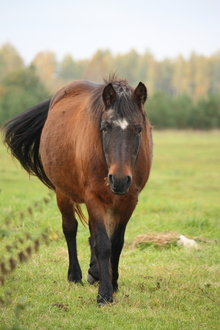The equine gastrointestinal tract is a complex system involved not only in digestion and nutrient absorption, but directly connected with immune health, function and even systemic inflammation. It is also high subject to changes influenced by diet, lifestyle and stressors.

The complexity of the equine digestive system
In his study, Dr. Schell is working to answer the question: What is the connection between the equine gastrointestinal tract, digestion, nutrient absorption and diet, lifestyle and stressors, relative to equine health and lameness?.
For many years, equine research data has shown us that in many populations of horses, especially those with active colitis or metabolic concerns, there is a shift or imbalance within the bacterial population in the gastrointestinal tract. In many instances, this condition is termed 'dysbiosis' as the overgrowth that is present is more of an imbalance or shift from one respect to the next.
In cases of metabolic syndrome and even laminitis, research data has demonstrated that there is an increase in the population of lactic acid producing bacteria, including Lactobacillus and Group D Streptococcus, but the exact connection as to cause or effect has not been determined.
It has been theorized that this overgrowth may actually contribute to decreased digestive capabilities, lowered nutrient absorption, production of potentially harmful byproducts by the bacteria, localized and systemic inflammation and even immune dysfunction.
In human literature, the concept of leaky gut syndrome or intestinal hyperpermeability is also an area of concern, whereby the lining of the intestinal tract becomes weakened due to several factors. As the interface becomes compromised, permeability is increased and absorption of potentially harmful substances ranging from bacteria to feedstuff preservatives can become a major issue, contributing further to inflammation, persistent infections and immune compromise.
In some cases of leaky gut syndrome, it has also been noted that a bacterial dysbiosis is present, which may be a contributing factor due to localized inflammatory response.
The ultimate question is what is the connection with equine health and lameness?
In a recent study finalized by Tom Schell, D.V.M. of Nouvelle Research, Inc., he evaluated 53 fecal samples from horses, performing serial culture dilutions and microscopic evaluations. The goal of the study was to determine if a microbial imbalance and overgrowth of lactic acid bacteria were present as outlined in past research articles, and if so, is there a correlation with malabsorption and permeability?
In this study, Dr. Schell was able to demonstrate a marked difference between a normal population of horses with no health problems and those horses with evident health problems ranging from laminitis to allergies. In the affected group, they demonstrated higher levels of Lactobacillus and Enterococcus species (Group D) with many also demonstrating evidence of malabsorption based on fecal Sudan staining.
One interesting note in the study was that the clinically affected horse population also tended to demonstrate higher use of processed grains and artificial supplements. The connection in this situation can only be theorized based on human data, including negative impact of higher processsed feeds on digestive health and also the higher incidence of added sugars to the diet which may actually fuel the overgrowth of these bacterial species.
The end conclusion was that some horses do demonstrate an overgrowth of lactic acid bacteria, which can be tied back to diet, lifestyle and stressors. The fact that some of these horses do have higher counts of lactic acid producing bacteria may assist us in understanding why one horse is more susceptible to conditions including laminitis and allergies upon exposure to Spring pastures or stressful events. The overgrowth is a real issue and may contribute to health and lameness problems on many levels.
The complete study may be found on Dr. Schell's consultation website, www.secondvet.com.
In a follow up study to be released in the coming weeks, Dr. Schell will highlight 7 horses from the trial and demonstrated the impact of diet modification and use of whole food supplementation to alter bacterial levels and improve patient outcome.
Questions and comments may be made to Dr. Schell via email at tschelldvm@gmail.com
Nouvelle Research, Inc. is the manufacturer of the Cur-OST line of curcumin based equine supplements that target the inflammatory response. Dr. Tom Schell has been an avid researcher of inflammation, applying and conducting research with the goal of developing new options to help maintain health in the horse. For more information please visit out website at www.curost.com or by calling 1-800-476-4702.
